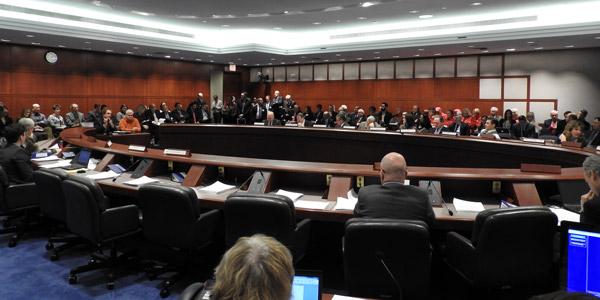By William Opalka
HARTFORD, Conn. — Supporters of the Millstone nuclear power plant on Tuesday issued impassioned pleas for Connecticut legislators to save the plant but were short on details on how to provide enough revenue to keep it operating beyond 2021.

Those supporters were speaking at a Joint Committee on Energy and Technology hearing to discuss a preliminary bill, which, for now, merely says its purpose is “to provide a mechanism for zero-carbon electric generating facilities to sell power to electric utilities.” Sen. Paul Formica (R), committee co-chair and lead sponsor of the bill, said the hearing was intended to gather input from different constituencies.
While plant owner Dominion Resources has not said that it will close the Waterford facility, the company has acknowledged that the plant is under financial stress because of record low power prices set by cheap natural gas.
“We need to gather all the facts because we need a baseload power source here in Connecticut,” Formica said. “But if this baseload goes away, what happens to rates?”
Millstone can produce 2,111 MW, or about half of the state’s energy needs.

Bill co-sponsor Melissa Ziobron, a Republican representative from the nearby 34th District, said her husband has worked at the plant for 20 years.
“The premise of Millstone closing is real,” Ziobron said. “It is present for our family and 1,200 others.” She and others said the plant’s closure would devastate the economy of southeastern Connecticut.
An aborted plan introduced at the end of last year’s legislative session is presumed to be the starting point in any current deliberations to help Millstone. In the waning hours of that session, the Senate unanimously passed a measure that would have allowed the plant to bid into the state procurement process now reserved for renewable energy, large-scale hydropower and trash-to-energy facilities.
The bill passed the Senate without any hearings, but time ran out for the House of Representatives to act.

Elin Swanson Katz, the state’s consumer counsel, took no position on the bill, but she said her office is pleased with the mechanisms the state has put in place for long-term energy procurement to protect ratepayers.
“These processes have been highly competitive and well managed,” Katz said.
John Erlingheuser, associate state director of advocacy at AARP, called the bill “a special deal that has the same impact as a subsidy” that effectively reclassifies 50% of the state’s generation as renewable energy.
Dominion contends that the policy is justified.
“If Connecticut wants the lowest-cost, longest-term resource that also meets its environmental and economic goals, the solicitation process has to be expanded,” Kevin Hennessey, the company’s director of state policy for New England, said in written testimony.

Power producers say that reverses 20 years of progress in building competitive markets in the region.
“Proposals to selectively grant some resources preferential treatment without regard for the impact of doing so on the rest of the power supply system risk highly adverse and likely irreversible consequences,” the Electric Power Supply Association wrote.

Eric Brown, general counsel for the Connecticut Business and Industry Association, disputed those who said Dominion needs to open its books to justify the policy change.
“We don’t need to see their books,” Brown said. “The marketplace has sent a very clear message: Nuclear power is struggling throughout the country. We’re losing plants in New England. That’s the best kind of evidence.”
Dominion commissioned a recent study indicating that state carbon emissions would increase by 2.5 million tons if the plant retired and was replaced by natural gas-fired generation.
Roddy Diotalevi, senior director of sales and external relations for UIL Holdings, said that Millstone is important in helping the state reach its environmental goals but that the costs to keep the plant running are still unknown.

“UIL remains concerned about the impact that these above-market payments will have on ratepayers and the negative effects that a long-term obligation and financial liability would have on the utility,” Diotalevi said.
Millstone and NextEra Energy’s Seabrook plant in New Hampshire are soon to be the only remaining nuclear plants in New England. Vermont Yankee closed two year ago, while the Pilgrim station in Massachusetts will shut down in 2019. New York’s nuclear fleet has been saved by a state subsidy, but that program is currently being litigated.



